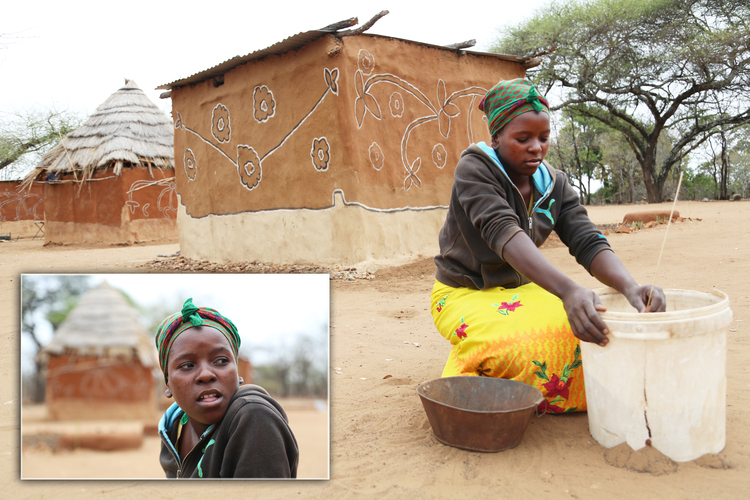
The Sunday Mail

It was mid-afternoon last Monday and 19-year-old MaNcube was home alone.
We had just arrived at the Machavele homestead, looking for any of the three wives that Philemon had left behind when he committed suicide recently.

19 -year old Grace Shoko is patiently waiting for her husband to come home this Christmas: Pictures — Believe Nyakudjara
Could MaNcube be one of the wives, we enquired.
“No, I am daughter-in-law at this homestead,” she answered, rather coyly.
For a 19-year-old, she looked very mature and mannerly, running around the homestead to get anything that could pass for a stool so that all of us could be comfortably be seated. There were four of us.
She explained that in the events following the circumstances of that fateful October morning, when her father-in-law hanged himself, after beating a daughter to death, two of Philemon’s wives had moved house.
The first wife, MaNcube’s mother-in-law, had moved back to her parents’ home in Chompani. The second, Mirriam Muratsva, though she had gone to Runde River for a four-day church pilgrimage with Beatrice Chiteve (the third wife), was not going to come back and would instead also head for parents’ home.
That left the 19-year-old, at least for the four days until Beatrice came back, as the co-guardian of the Machavele homestead. A fellow daughter-in-law and her husband had gone to tend to their crops and would be back by end of day.
But where was her husband?
“We got married in February this year and in March my husband left for South Africa. Last week when he phoned, he said he might come back for Christmas, and I am patiently waiting for him to return.”
Still with the shyness of a teenager, she informed us that Beatrice, who lost her daughter in the domestic dispute would be back in the evening, and if we could come back the morrow, she would be there. We thanked her for the info and left.
For about half our journey back to where we had left our car, some 5km away, our discussions centred on the situation that Grace Shoko, MaNcube to the Machevele family, found herself in.
The two police officers who accompanied us on the journey explained that such situations are commonplace here, which because of its proximity to South Africa, sees many young men trekking to South Africa in search of employment. The following day, we sought more time with MaNcube.
At 19, she got married early this year to Innocent Machavele, himself only a year older. Sitting next to her as she narrated her married life was 22-year-old Beatrice, now a widow. Beatrice is a mother-in-law to MaNcube, as per culture.
In view of the circumstances, wasn’t she worried about HIV given that her husband was far away?
“The idea is to accept it. (If my husband comes back and) he then infects me, the way forward would be to be get on medication and move on. I am being faithful here, waiting for him to come and I also expect him, wherever he is, to be faithful,” she explains.
If she had continued with her education after Grade Seven in 2010, she would be in Lower Six this year. But because her family could not afford it, she opted for marriage.
“It is the Shangani culture,” says one of the police officers, “that prepares these young girls for marriage. And once they fail to continue with school, some of them opt for marriage, even at such young ages. The rites of passage that they undergo somehow influences their decision, that they are ripe for marriage.
“Even at the police station, we sometimes handle cases where parents would be wanting to report someone for taking their child away, but when we ask the young girl, she confidently says she is in love and ready for marriage. Under such circumstances, parents – and even us, cannot proceed.”
Usually held in a year that the harvests are good, the rites of passage of the Shangani people, who are the dominant ethnic group in Chiredzi South, are a cultural practice that “graduates” boys into men and girls into women.
Headman Mapapa, born Hanyani Zava, said: “This year, because we had poor harvests, we did not carry out the ceremony but last year we had one. The ceremonies are usually done in July, just as schools are about to close and last almost the whole month of August. If you are not of Shangani origin, you are not allowed inside the camp but outsiders can come and join in the celebrations at the end of the rites.
“This is usually a big cultural affair and depending on each family’s capabilities, each graduate is given assets to start off life with. An acknowledgement that they have come of age.”
For 19-year-old MaNcube, as the clock ticks closer to Christmas, all she is hoping for is that the falling rand does not deter her husband from making the trip home.
Then they can be husband and wife – even if it is only for a short time — before he goes Down South.



